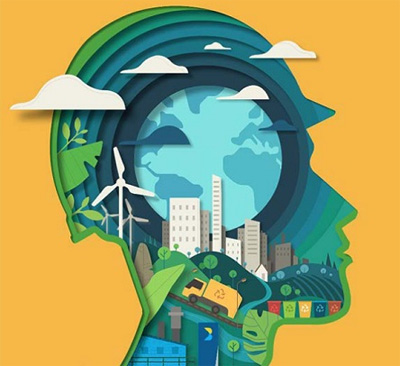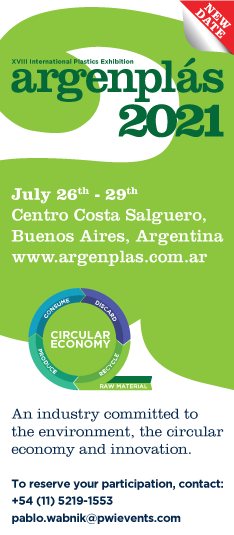| Plastics News |
Braskem Affirms Commitment to Circular Economy and to Achieve Carbon Neutrality by 2050
November, 10, 2020 - Braskem today announced its latest sustainability ambitions to significantly expand its efforts to eliminate plastic waste in the environment by 2030 and to achieve carbon neutrality by 2050. In 2009, Braskem launched the company's long-term sustainability goals for 2020, which emphasized Braskem's commitment to providing solutions that address climate change. Braskem says it has invested in the development of I'm green products sourced from renewable sources and recycled content, while at the same period reducing the intensity of carbon emissions from its operations by 20 percent. In 2018, Braskem further committed to 100% of plastic packaging being reused, recycled, or recovered by 2040. As part of its evolving sustainable development strategy, Braskem today announced additional commitments to mitigate climate change, eliminate plastic waste and provide solutions for recycled products in its markets. Braskem Sustainability Commitments
Roberto Simoes, Braskem CEO, states, "Braskem has a long history of taking action to create a more sustainable world. We have invested in renewable resources since the company's formation in 2002. As the first and leading producer of biopolymers, Braskem has been at the forefront of creating positive change to support people, society, and the environment. Braskem intends to continue its leadership as the industry transitions to a carbon neutral circular economy. Plastics plays a vital role in society, and we believe that the strategic direction of our latest sustainability commitments will allow plastics to continue its role in advancing innovation and providing sustainable solutions. With the new sustainable development goals we announced today, we are committing to create products to help our clients meet aggressive recycled content goals in the next several years and to achieve carbon neutrality by 2050." Braskem's I'm Green Portfolio Braskem's I'm green brand was born in 2010 together with renewable polyethylene (PE)) produced on an industrial scale, using sugarcane as a raw material. Cultivation of sugarcane utilized in the production of I'm green polyethylene captures carbon dioxide (CO2) and releases oxygen (O2), which means Braskem's bioplastic has a negative carbon footprint, the company claims. From a cradle-to-gate life-cycle perspective, every ton of I'm green Polyethylene produced equates to 3.09 tons of CO2 captured from the atmosphere, helping reduce greenhouse gas emissions. The fully recyclable product was developed at Braskem's Innovation and Technology Center located at the Triunfo Petrochemical Complex in Brazil, where the company invested US$ 290 million to build an industrial unit with production annual capacity of 200 Kton. Since its initial launch, Braskem's I'm green sustainable portfolio of chemicals and polymers has expanded and now includes a range of other solutions made from post-consumer plastic waste as well as bio-based materials including green EVA. Today, the I'm green portfolio includes ' I'm green Bio-Based' products, ' I'm green Recycled' products made from recovered plastic waste as well as ' I'm green Bio-based and Recycled' products. Advancing the Carbon Neutral Circular Economy Braskem's strategy to achieve carbon neutrality focuses on three pillars: Reducing emissions; Offsetting emissions; and Capturing emissions. Efforts to reduce emissions will concentrate on improving energy efficiency in existing operations as well as increasing the use of low carbon and renewable energy in current operations. Additionally, Braskem will continue to explore and invest in new low carbon intensity process technologies. In the area of offsetting emissions, Braskem will focus on accelerating investments in renewable feedstock based chemicals and polymers. Lastly, Braskem's efforts around capturing emissions are being supported through the research and development of opportunities in using CO2 emissions as feedstock for conversion to value-added Chemicals. Braskem's says its Circular Economy Strategy will continue to aggressively advance projects in mechanical and molecular Recycling. Braskem plans to continue leveraging its market leadership, polymer expertise and track record of growth in sustainability to develop a robust portfolio of recycled products for its clients. Braskem's sustainable development strategy focuses on seven dimensions: 1) Health & Safety, 2) Financial & Economic Results, 3) Elimination of Plastic Waste, 4) Mitigation of Climate Change, 5) Operational Eco-efficiency, 6) Social Responsibility & Human Rights, and 7) Sustainable Innovation. These dimensions align closely with the UN 2030 Agenda's Sustainable Development Goals (SDGs) and The Paris Agreement to mitigate climate change As the North American leader in polypropylene, Braskem is committed to move towards a Circular Economy, where nothing is wasted and everything is transformed. Earlier this year, Braskem announced it reached its 2020 goal to become an Operation Clean Sweep blue member. Braskem also became a founding member and funding partner of the Polypropylene Recycling Coalition, an initiative of The Recycling Partnership with a focus on increasing U.S. curbside Recycling access for polypropylene (PP) and ensuring PP is widely recovered and reused in end-markets such as food and beverage packaging, consumer products and automotive. Braskem is also a founding member of the Alliance to End Plastic Waste. Source: Braskem |


